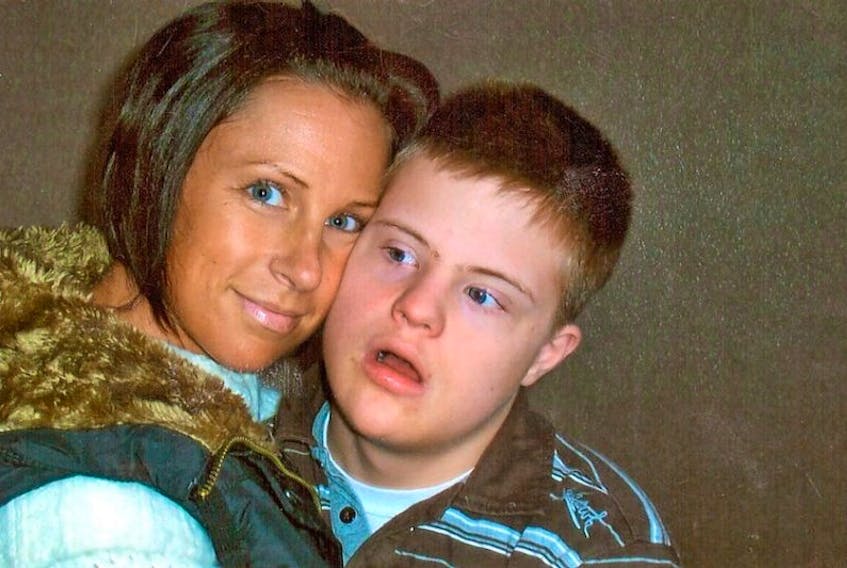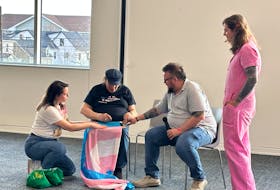Twenty-year-old Josh Whittaker has been walking in circles, around and around his hospital room in Summerside, waiting to get out.
He has been there since November despite the fact his doctor says he no longer needs to be in a hospital.
Josh has Down syndrome, is autistic and non-verbal. Until recently, he lived with his parents Debbie and Ron Whittaker – a happy, active young man who loved swimming, soccer and walking his dog.
His parents took him everywhere, even on trips abroad.
But late last year, something changed.
Josh became distant, would become upset if anyone came near. He wanted to be alone, no longer enjoyed his regular activities.
Then began to get aggressive.
“We couldn’t believe that this was happening. We went to psychologists, we went to psychiatrists. Medications made him more aggressive. We had him tested for everything,” his mother Debbie Whittaker said.
“Finally, we weren’t able to deal with it on our own. We couldn’t keep going on like that.”
On the advice of their doctor, they admitted Josh to hospital to figure out what was wrong.
A change in diet and medication saw improvements in his behaviour and mood.
“This is when we began the journey of – now we find a suitable place for Josh to live where he can progress, where he can build trusting relationships again,” his mother said.
“Bringing him back home with us is not the best for Josh.”
But figuring out where he will go and what supports are available to him has become a bureaucratic nightmare for the Whittakers.
The family hoped to set him up in an apartment with a support worker to help him – a program offered through a private service organization.
But after months of meetings and negotiations, the Department of Community Services would not agree to fund this plan.
They were told it was too costly, despite the fact Health P.E.I. is spending upwards of $36,000 a month to keep him at the Prince County Hospital.
So Josh remains in the hospital.
“The doctor has said this is not the place for him,” his mother said, swallowing back tears.
“It’s just not how you picture your son or daughter. It’s not what you want for them.”
The Whittakers are not alone.
Bridget Cairns from the P.E.I. Association for Community Living says there are many Islanders with intellectual disabilities inappropriately housed in hospitals, manors and medical facilities across the province.
It’s something the association has been voicing concern about for years.
“We’d like to see individuals that do not need medical care not be admitted into hospital as an option,” Cairns said.
“If they are admitted for hospital for medical needs, there needs to be a policy put in place in terms of an exit strategy – where they’re going to go and that a time limit is imposed.”
The issue was identified in a 2006 report entitled ‘Lost Connections,’ by the P.E.I. Citizen Advocacy for the Association of Community Living.
It found institutionalizing people with intellectual disabilities left them under-stimulated, isolated and at risk of depression and illness.
Another report the following year reiterated the same the same concerns.
“More can be done to provide flexible home care and respite supports,” the 2007 report entitled ‘Home of Our Own’ stated, completed by Partners for Change, a coalition of advocacy groups.
“There is a need for more individualized community-based supports which provide a range of options, particularly for housing.”
Housing was also flagged as a major issue in the province’s comprehensive Disability Services Review, completed in 2009.
Twilah Stone was part of the committee that conducted this review and is currently a member of Partners for Change.
She now says she is "embarrassed" to have been part of that review, because she heard countless families tell their stories who urged the committee to not let their concerns end up in a report that would simply gather dust.
“That’s exactly what happened,” Stone said.
“We put together a really good report and nobody paid any attention to it. I felt used, I felt our time was wasted as a committee. Nobody listened to it.”
Despite all the concerns, reports, and recommendations Stone says she has seen no improvements.
“There doesn’t seem to be any options for families, so they find themselves agreeing to admitting their sons and daughters into these facilities and they end up in no-man’s land, they get forgotten,” Stone said.
“What starts as a short-term measure goes on for months and sometimes even years.”
Pam Trainor, executive director of acute care, mental health and addictions with Health P.E.I., admits this is an increasing occurrence.
“It seems to be a growing population – more people needing services,” she said.
“These situations are happening more frequently because there seems to be an increasing demand for housing services and seem to be more complex cases over time.”
And it has wider implications.
Many Islanders with intellectual disabilities in hospitals or medical facilities are housed in mental health wards.
This is contributing to a backlog for mental health services and beds in hospitals across the province.
“That means it’s more challenging for those who really need acute care services to get into acute care units, more challenging for folks to get into the Hillsborough Hospital as well,” Trainor said.
“It’s very much a challenge and seems to be becoming a greater challenge for us in the health system.”
Rhea Jenkins from the Department of Community Services, which administers the disability support program, says her department has also noticed an increasing demand for housing of Islanders with intellectual disabilities.
Also, an increasing number of them are in the young adult age range, Jenkins said.
“We certainly recognize that there are increasing needs for residential services, and that need does present challenges for finding placements,” she said.
“Placements can take time to find and secure, we certainly work with the individual case plan to plan around that. But it is a process.”
This process has gone on far too long for the Whittakers. They’re now taking their concerns to the media and to social media websites in a last ditch attempt to find a better place for their son Josh to live.
Josh spends the weekends at his parents’ home in Georgetown. They are saddened by the toll living at the hospital has taken on their son.
“He just finds a little area and just walks around in circles in this little area, because that’s what he does in his room in the hospital. He’s isolated there,” she said through tears.
“We are being told by the government that they have a plan. We’re in the dark. We don’t know what that plan is.”
In the meantime, Josh continues to wait in his room at the Prince County Hospital.
“There’s not enough places for individuals like Josh. You know there has to be a time when you have to let them go. We just didn’t think it would be like this.”
Twenty-year-old Josh Whittaker has been walking in circles, around and around his hospital room in Summerside, waiting to get out.
He has been there since November despite the fact his doctor says he no longer needs to be in a hospital.
Josh has Down syndrome, is autistic and non-verbal. Until recently, he lived with his parents Debbie and Ron Whittaker – a happy, active young man who loved swimming, soccer and walking his dog.
His parents took him everywhere, even on trips abroad.
But late last year, something changed.
Josh became distant, would become upset if anyone came near. He wanted to be alone, no longer enjoyed his regular activities.
Then began to get aggressive.
“We couldn’t believe that this was happening. We went to psychologists, we went to psychiatrists. Medications made him more aggressive. We had him tested for everything,” his mother Debbie Whittaker said.
“Finally, we weren’t able to deal with it on our own. We couldn’t keep going on like that.”
On the advice of their doctor, they admitted Josh to hospital to figure out what was wrong.
A change in diet and medication saw improvements in his behaviour and mood.
“This is when we began the journey of – now we find a suitable place for Josh to live where he can progress, where he can build trusting relationships again,” his mother said.
“Bringing him back home with us is not the best for Josh.”
But figuring out where he will go and what supports are available to him has become a bureaucratic nightmare for the Whittakers.
The family hoped to set him up in an apartment with a support worker to help him – a program offered through a private service organization.
But after months of meetings and negotiations, the Department of Community Services would not agree to fund this plan.
They were told it was too costly, despite the fact Health P.E.I. is spending upwards of $36,000 a month to keep him at the Prince County Hospital.
So Josh remains in the hospital.
“The doctor has said this is not the place for him,” his mother said, swallowing back tears.
“It’s just not how you picture your son or daughter. It’s not what you want for them.”
The Whittakers are not alone.
Bridget Cairns from the P.E.I. Association for Community Living says there are many Islanders with intellectual disabilities inappropriately housed in hospitals, manors and medical facilities across the province.
It’s something the association has been voicing concern about for years.
“We’d like to see individuals that do not need medical care not be admitted into hospital as an option,” Cairns said.
“If they are admitted for hospital for medical needs, there needs to be a policy put in place in terms of an exit strategy – where they’re going to go and that a time limit is imposed.”
The issue was identified in a 2006 report entitled ‘Lost Connections,’ by the P.E.I. Citizen Advocacy for the Association of Community Living.
It found institutionalizing people with intellectual disabilities left them under-stimulated, isolated and at risk of depression and illness.
Another report the following year reiterated the same the same concerns.
“More can be done to provide flexible home care and respite supports,” the 2007 report entitled ‘Home of Our Own’ stated, completed by Partners for Change, a coalition of advocacy groups.
“There is a need for more individualized community-based supports which provide a range of options, particularly for housing.”
Housing was also flagged as a major issue in the province’s comprehensive Disability Services Review, completed in 2009.
Twilah Stone was part of the committee that conducted this review and is currently a member of Partners for Change.
She now says she is "embarrassed" to have been part of that review, because she heard countless families tell their stories who urged the committee to not let their concerns end up in a report that would simply gather dust.
“That’s exactly what happened,” Stone said.
“We put together a really good report and nobody paid any attention to it. I felt used, I felt our time was wasted as a committee. Nobody listened to it.”
Despite all the concerns, reports, and recommendations Stone says she has seen no improvements.
“There doesn’t seem to be any options for families, so they find themselves agreeing to admitting their sons and daughters into these facilities and they end up in no-man’s land, they get forgotten,” Stone said.
“What starts as a short-term measure goes on for months and sometimes even years.”
Pam Trainor, executive director of acute care, mental health and addictions with Health P.E.I., admits this is an increasing occurrence.
“It seems to be a growing population – more people needing services,” she said.
“These situations are happening more frequently because there seems to be an increasing demand for housing services and seem to be more complex cases over time.”
And it has wider implications.
Many Islanders with intellectual disabilities in hospitals or medical facilities are housed in mental health wards.
This is contributing to a backlog for mental health services and beds in hospitals across the province.
“That means it’s more challenging for those who really need acute care services to get into acute care units, more challenging for folks to get into the Hillsborough Hospital as well,” Trainor said.
“It’s very much a challenge and seems to be becoming a greater challenge for us in the health system.”
Rhea Jenkins from the Department of Community Services, which administers the disability support program, says her department has also noticed an increasing demand for housing of Islanders with intellectual disabilities.
Also, an increasing number of them are in the young adult age range, Jenkins said.
“We certainly recognize that there are increasing needs for residential services, and that need does present challenges for finding placements,” she said.
“Placements can take time to find and secure, we certainly work with the individual case plan to plan around that. But it is a process.”
This process has gone on far too long for the Whittakers. They’re now taking their concerns to the media and to social media websites in a last ditch attempt to find a better place for their son Josh to live.
Josh spends the weekends at his parents’ home in Georgetown. They are saddened by the toll living at the hospital has taken on their son.
“He just finds a little area and just walks around in circles in this little area, because that’s what he does in his room in the hospital. He’s isolated there,” she said through tears.
“We are being told by the government that they have a plan. We’re in the dark. We don’t know what that plan is.”
In the meantime, Josh continues to wait in his room at the Prince County Hospital.
“There’s not enough places for individuals like Josh. You know there has to be a time when you have to let them go. We just didn’t think it would be like this.”









